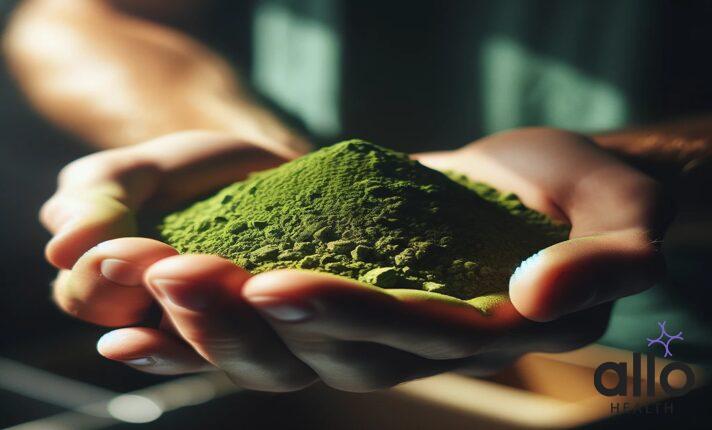Exploring the Link Between Kratom and Sex Drive

Allo Health is dedicated to personalized well-being, offering support and trusted information tailored to individual health goals. The platform emphasizes human-generated content, led by a distinguished medical team of experts, including physicians and sexual health specialists. Their commitment to credibility involves rigorous fact-checking, authoritative research, and continuous updates to ensure accurate, up-to-date information. Allo Health's unique approach goes beyond conventional platforms, providing expert-led insights and a continuous commitment to excellence, with user feedback playing a crucial role in shaping the platform's authoritative voice.

Dr.Sushma.V completed MBBS degree from BGS GIMS,bangalore
Why This Was Upated?
Our experts continually monitor the health and wellness space, and we update our articles when new information became available.
Updated on 01 June, 2024
- Article was updated as part of our commitment to diversity, equity, and inclusion.

"The following blog article discusses alternative medicine practices and their potential effects or benefits. However, it is important to note that the information provided is for general educational purposes only and should not be considered as medical advice or a substitute for professional guidance from a qualified healthcare professional. Before considering any alternative medicine practices or treatments, it is recommended to consult with a healthcare professional.
Book consultation
Alternative medicine encompasses a wide range of practices that may not have undergone rigorous scientific evaluation or received widespread acceptance within the medical community. The effectiveness, safety, and appropriateness of alternative medicine practices can vary significantly depending on the individual, their specific medical conditions, and other factors.
It is important to approach alternative medicine practices with caution and skepticism. Some practices may carry potential risks or interact with existing medical treatments. A healthcare professional can provide guidance based on your medical history, evaluate the available evidence, and offer informed advice regarding the potential benefits and risks of alternative medicine practices.
Individuals with specific medical conditions, allergies, or taking medications should exercise particular caution when considering alternative medicine practices. Some practices may have contraindications or adverse effects, and it is essential to discuss these potential concerns with a healthcare professional before pursuing any alternative treatments."
Kratom, derived from the Mitragyna speciosa tree in Southeast Asia, is intriguing with its dual stimulant and sedative effects. Traditionally used for its medicinal properties, kratom contains compounds like mitragynine, affecting users differently based on dosage and strain. This article explores kratom’s history, usage and forms, alongside its debated role in enhancing sexual health and managing erectile dysfunction. While some studies and user experiences suggest benefits in sexual performance, caution is advised due to the lack of comprehensive research and potential health risks. Understanding kratom’s effects, especially on libido and erectile function, requires navigating anecdotal evidence and scientific research, underscoring the need for informed and cautious use.
Understanding Kratom: Origins, Uses, and Forms
Kratom, officially known as Mitragyna speciosa, is a tropical evergreen tree from the coffee family, native to Southeast Asia, including Indonesia, Malaysia, Thailand and Papua New Guinea. It has a long history of traditional use in these regions for its potential health benefits.
The leaves of the kratom tree contain key alkaloids, notably mitragynine and 7-hydroxy mitragynine, which interact with brain receptors to produce effects that can be either stimulating or sedating, depending on the strain and amount used. People often turn to kratom for its ability to enhance mood, alleviate pain, provide energy boosts and promote relaxation.
Kratom can be found in several forms, such as dried and powdered kratom leaves, capsules, and extracts, and as a component in various products like teas, edibles, and liquid shots.
How Kratom May Enhance Libido and Performance
- Boosts Energy Levels: Kratom is linked to increased energy, potentially enhancing sexual performance for those with busy, energy-draining lifestyles.
- Reduces Anxiety: With its potential anxiety-reducing effects, kratom might alleviate performance anxiety sex, benefiting sexual drive and confidence.
- Stimulates Euphoria: Users often report feelings of euphoria, which can increase excitement and improve sexual performance.
- Improves Sociability: Enhanced social skills from kratom use may reduce anxiety and boost confidence in sexual interactions.
- Boosts Self-Confidence: By fostering a positive state of mind and increasing energy, kratom may improve self-esteem and reduce performance anxiety.
Scientific Insights into Kratom and Libido
The study titled “Improved Sexual Functioning of Long-Term Daily Users of Mitragyna speciosa” explored the sexual health benefits of kratom among 92 Malaysian males who were regular users. The key findings were:
- 82% experienced increased sexual energy.
- 77% had delayed ejaculation.
- 76% reported no trouble maintaining an erection.
- 55% experienced longer climaxes.
- 48% reported an increase in sexual desire.
Overall, 85% of participants noted improved satisfaction in their sex lives due to kratom use. Despite these positive reports, it’s important to note that the study’s limited scope and reliance on self-reported data mean that more research is needed to fully understand kratom’s impact on sexual function. Anecdotal evidence supports these findings, but as with any supplement, caution and further investigation are advised.
Identifying the Best Kratom Strains for Enhancing Sex Drive
Green Vein Kratom: Balances stimulation and sedation, making it ideal for both boosting libido and performance. Recommended types of kratom strains include:
- Green Maeng Da: Known for its potent energizing and mood-enhancing effects.
- Malaysian Green Strain: Offers a balanced effect of energy and calm, suitable for enhancing libido.
White Vein Kratom: Celebrated for its significant mood-boosting and stimulating properties, ideal for increasing sexual desire and energy. The top white strains for enhancing libido are:
- White Sumatra: Delivers a strong feeling of euphoria and energizing effect, potentially leading to a heightened sexual experience.
- Pontianak White Horn: Known for its euphoric and stimulating effects, making it a popular choice for enhancing sexual mood and performance.
Red Vein Kratom: While being the least potent in terms of stimulation, it’s valued for its calming effects, which can be beneficial for individuals with performative anxiety. Recommended strains for a more relaxed sexual experience include:
- Borneo Red: Offers relaxation and a mild energy boost, helping to alleviate mental anxiety without sedation.
- Red Sumatra: Known for its deeply calming effects, it can help calm anxiety disorder and enhance comfort during sexual activities.
Each of these strains of kratom focuses on offering unique benefits that can cater to different aspects of sexual enhancement, from boosting energy and mood to alleviating anxiety and improving sociability. Experimentation with strains and dosages is key to finding the optimal balance that suits individual needs and preferences.
Potential Side Effects and Precautions
- Dry Mouth: A common side effect of kratom, leading to discomfort and increased thirst.
- Elevated Heartbeat: Users may experience a faster heart rate, which can be concerning for those with cardiovascular conditions.
- Nausea: Some individuals may feel nauseous, especially at higher doses or on an empty stomach.
- Stomach Pain: Kratom can cause gastrointestinal discomfort or pain in some cases.
- Headaches: A possible side effect, particularly in new users or with overuse.
- Caution with Aphrodisiacs: Mixing kratom with aphrodisiacs like Viagra can lead to unpredictable effects and should be done with caution.
- Potential for Interaction: Kratom may interact with other medications or supplements, so it’s important to consult with a healthcare provider before combining it with other substances.
- Start with Low Doses: New users should begin with smaller amounts to assess tolerance and avoid potential side effects.
- Monitor for Allergic Reactions: As with any new substance, watch for signs of an allergic reaction.
- Avoid Overuse: To minimize risks, users should avoid taking large doses or using kratom too frequently.

Impact of Kratom on Sex Drive
Kratom’s impact on sex drive benefits is a topic that has gathered both interest and debate, largely due to its complex nature and the dual effects it can have on individuals. Here’s a breakdown of how kratom might influence sexual desire, based on historical use, anecdotal evidence, and its pharmacological profile:
Historical Context and Anecdotal Evidence
- Traditional Use: In traditional Thai medicine, kratom was utilized as an aphrodisiac, suggesting its potential to enhance sexual desire and performance historically.
- Varied User Reports: Anecdotal reports on kratom’s impact on libido are mixed. Some users claim an increase in sexual desire and performance, while others experience a decrease, particularly with prolonged use.
Potential Causes of Low Libido
- Psychological Factors: Stress, depression, and anxiety can significantly lower libido, affecting sexual desire and responsiveness.
- Physical Health: Conditions like insomnia and malnutrition can also lead to decreased sexual interest.
- Medications and Diseases: Certain medications and illnesses are known to reduce libido as a side effect.
Kratom and Libido: Understanding the Effects
- Opioid System Interaction: Kratom’s interaction with the body’s opioid system may cause a delay in sexual response, a side effect often associated with opioid substances.
- Delayed Sexual Response: Particularly in men, the use of kratom might result in a delayed sexual response, aligning with the opioid effects seen with other opioids.
- User Experience Variability: Some kratom users report a decrease in libido with extended use, which can often be reversed by reducing consumption frequency or changing kratom strains.
- Natural Aphrodisiac Alternatives: For those experiencing libido loss, integrating natural aphrodisiacs like maca or ginseng may offer benefits without the potential downsides of kratom.
Kratom for Erectile Dysfunction: A Cautionary Overview
Using kratom for erectile dysfunction (ED) is speculative and not supported by scientific research. Here’s a concise overview:
- Stimulant and Mood Effects: Some believe kratom’s stimulant properties and mood enhancement at low doses could positively affect sexual performance.
- Potential Risks: There’s a lack of clinical evidence on kratom’s safety and effectiveness for ED, and it may carry side effects like nausea and dizziness.
- Consult Healthcare Providers: It’s crucial to talk to a healthcare professional about erectile dysfunction to explore safe and approved treatment options rather than self-medicating with unproven substances like kratom.
Approach kratom with caution and prioritize professional medical advice for treating erectile dysfunction.
Is Kratom an Opioid?
Kratom influences the brain’s opioid receptors, acting as a stimulant in low doses and offering pain relief in higher doses, similar to opioids but with the potential for addiction.
Kratom’s Effects
- Pain Relief: Kratom may effectively relieve chronic pain by targeting opioid receptors. One of its compounds is significantly more potent than morphine.
- Mood Enhancement: There are suggestions of kratom’s utility in treating opioid addiction and withdrawal. It may also have antidepressant properties and act as a hunger suppressant.
Health Risks to Consider
- Side Effects: Commonly include nausea, constipation, sweating, itching, dizziness, dry mouth, hallucinations, seizures and liver damage.
- Opiate Withdrawal: Some use kratom for opioid withdrawal treatment, though it’s not officially sanctioned for this purpose and can pose health risks.
Long-term Effects and Withdrawal
- Prolonged Use: Long-term kratom users reported several adverse effects, including darkened facial skin and constipation.
- Withdrawal Symptoms: Can include hostility, muscle pain, vomiting and depression, lasting about a week.
Kratom Dosage Guidelines: A Brief Overview
Determining the right kratom dosage lacks official guidance due to no FDA approval. Here’s a simplified guideline:
- Low Doses (<5 grams): May act as a stimulant, similar to caffeine, increasing energy levels and alertness.
- High Doses (5-15 grams): Tend to have sedative effects, offering pain relief but with increased risk of side effects.
Considerations:
- Dosage varies by individual needs, strain potency, and intended effects.
- Start with a low dose to gauge tolerance and minimize side effects.
- Consult with a healthcare provider before using kratom, especially if on other medications or having health issues.
Remember, due to kratom’s potency and varied effects, cautious experimentation and medical advice are recommended.
Conclusion
Kratom, with its complex profile of stimulating and sedative effects, has been a subject of both traditional use and modern curiosity. Its potential to enhance sexual health, alleviate pain and improve mood makes it a compelling botanical. However, the lack of comprehensive research and the variability in individual responses underscore the importance of proceeding with caution. Users should prioritize informed decision-making and consider health risks and legal status in their area.
Most Asked Questions
-
Is kratom legal to use?
Kratom's legal status varies by country and within countries, such as the United States, where it may vary by state. It's important to check the current legal status in your specific location before purchasing or using kratom.
-
Can kratom help with pain management?
Many users report that kratom can help manage pain, acting on opioid receptors similarly to pain medications but without the same level of risk for dependency. However, scientific research is limited, and it's not officially approved for pain management.
-
How does kratom affect mood?
Kratom is reported to have mood-lifting properties, with low doses providing stimulating effects and higher doses potentially offering more sedative, mood-stabilizing benefits. Users often report feeling more upbeat and less anxious.
-
What is the recommended dose of kratom for new users?
New users are advised to start with a low dose, typically below 2-3 grams, to assess tolerance and avoid potential side effects. Dosing can vary based on strain, individual tolerance, and desired effect.
-
Are there any risks associated with kratom use?
Yes, kratom use can lead to side effects such as nausea, dizziness, and constipation. Long-term use can increase the risk of dependence and withdrawal symptoms. It's recommended to use kratom cautiously and consult with a healthcare provider if you have health concerns.







































